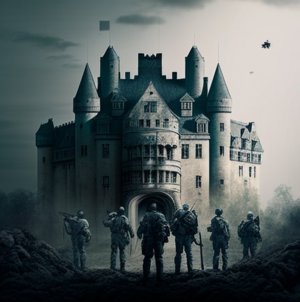The Communal Union of the Ice States
The Communal Union of the Ice States was a regime in The Ice States, a nation in Greater Dienstad. The regime was originally formed in 1418 as a rebel administration presiding over Cruxhampton and Southport City, before overthrowing the Empire regime the same year, placing it in control of the whole of the Ice States, including its overseas territories Hinnaland and Surisjardinar. The Communal Union later transformed into a civilian regime, and is ruled based on the ideals of communism enforced via the constitution of the regime. The nation retains a democratic system of government, with elections taking place each five years for President. The Ice States was a member of the World Assembly, via its WA mission. The regime now has de facto jurisidicton over Communist Oldwitch only, which exists under occupation of the People's Unified Federation.
History
Formation
Main article: Second Ice Civil War
The Communal Union of the Ice States was initially the name of various communes set up in Cruxhampton and Southport City in June 1418 by a secret rebel militia, the Communist Freedom Army (CFA), in a Marshite-backed occupation of the city set up in response to an attempted firebombing of the former by the Ice Air Force, in turn in response to mass protests throughout the city. The CFA would subsequently commence the March of July, an attempt to occupy various areas throughout the Ice States connecting Cruxhampton and Southport City. The March of July, along with a multinational invasion by the People's Unified Federation, Holy Marsh and the Golden Throne (the latter of which established an occupied "Green Zone" in the Northernmost parts of Ormont), resulted in the Empire losing de facto jurisdiction over a significant portion of the Ice States, with the territories between Southport City and Cruxhampton all becoming part of the Communal Union.
A Marshite-backed coup d'etat would then be performed by the CFA in the royal castle of Stonegrad, on October 7 the same year. The coup involved the raiding of the castle by CFA forces, who would then arrest the Emperor, Sotolo II, the Divine Scribe Theodore Lowney, and the Prince of the Ice States, Pedro Sotolo. This resulted in forces of the Ice military stationed throughout the Ice States surrendering, with the entire nation quickly coming into the control of the Ice States. October 7 was celebrated as a public holiday in the Ice States as "Freedom Day". This holiday was abolished upon the fall of the Communal Union.
Constitutional convention
The first and incumbent President of the Ice States is Courtney Hazelbush, first selected as General-President to rule over the Communal Union when it was initially formed. Later that year, in December 1418, Hazelbush would draft a national constitution which inter alia would mandate a communist economic system, elections for the Presidency every eight years, and allow the President to appoint Ministers. Further amendments would then be effected during the drafting process, including reducing the term for Presidency to five years. A binding national referendum would then be run to approve the constitution, such that the constitution would receive support from 65% of voting citizens. Merely a week later, a Presidential election would then be held, in which Hazelbush would be confirmed as President by a landslide.
Economy
The Communal Union maintained a communist system domestically. Either joining a worker's cooperative, or being employed directly by the government, was mandatory for all adult citizens apart from those who were unable to do so (eg retirees). However, all individuals, regardless of whether they were employed, received a certain quota of items they can receive; said quota was spent in the same way as money, except that prices were determined by the Ministry of Economic Affairs, and spent quota was not transferred to any other entity. Ministry-sanctioned charitable organisations, as well as the government itself, were exempted from quota requirements. However, the former were subject to annual auditing, while the latter are required to permit itself to be subject to audits.
Foreign trade with capitalist nations, however, was permitted through a special mechanism. Quota may be exchanged by the Ministry of Economic Affairs only into money. Such money may be used directly for the purchase of foreign goods and services, or converted into quota. The domestic selling of goods using currency remained strictly prohibited.
Government
The legislature of the Ice States entirely served at the pleasure of the President. The legislature, in turn, elected a Speaker from its membership. The President also appointed all other major leadership positions in the Executive. Laws can be passed by a majority vote of the legislature, although where there is no supermajority (>55%) in either direction or when a decision is likely to be generally controversial (enforced on the discretion of the Speaker) a referendum must be held including all registered Ice voters. Only two such referenda were held: one for reentering the World Assembly, and another for abolishing the death penalty. The regime's first, last and only President was Courtney Hazelbush. Meanwhile, the judiciary existed entirely independently of the legislature and executive. All judges were elected each five years, three months after the end of the most recent President election. Judges then elected amongst themselves a Chief Justice, who serves throughout the same five-year term.

